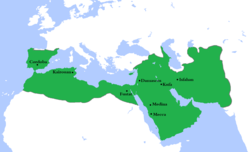 The Umayyad Caliphate (Arabic: ٱلْخِلافَةُ ٱلأُمَوِيَّة, trans. Al-Khilāfatu al-ʾUmawiyyah), also spelt Omayyad,[2] was the second of the four major caliphates established after the death of Muhammad. The caliphate was ruled by the Umayyad dynasty (Arabic: ٱلأُمَوِيُّون, al-ʾUmawiyyūn, or بَنُو أُمَيَّة, Banū ʾUmayya, "Sons of Umayya"), hailing from Mecca. An Umayyad clan member had previously come to power as the third Rashidun Caliph, Uthman ibn Affan (r. 644–656), but official Umayyad rule was established by Muawiya ibn Abi Sufyan, long-time governor of Syria, after the end of the First Muslim Civil War in AD 661. Syria remained the Umayyads' main power base thereafter, and Damascus was their capital.
The Umayyad Caliphate (Arabic: ٱلْخِلافَةُ ٱلأُمَوِيَّة, trans. Al-Khilāfatu al-ʾUmawiyyah), also spelt Omayyad,[2] was the second of the four major caliphates established after the death of Muhammad. The caliphate was ruled by the Umayyad dynasty (Arabic: ٱلأُمَوِيُّون, al-ʾUmawiyyūn, or بَنُو أُمَيَّة, Banū ʾUmayya, "Sons of Umayya"), hailing from Mecca. An Umayyad clan member had previously come to power as the third Rashidun Caliph, Uthman ibn Affan (r. 644–656), but official Umayyad rule was established by Muawiya ibn Abi Sufyan, long-time governor of Syria, after the end of the First Muslim Civil War in AD 661. Syria remained the Umayyads' main power base thereafter, and Damascus was their capital.
The Umayyads continued the Muslim conquests, incorporating the Caucasus, Transoxiana, Sindh, the Maghreb and the Iberian Peninsula (Al-Andalus) into the Muslim world. At its greatest extent, the Umayyad Caliphate covered 11,100,000 km2 (4,300,000 sq mi)[3] and 62 million people (29% of the world's population),[4] making it one of the largest empires in history in both area and proportion of the world's population.
The Umayyad Caliphate was de facto secular.[5] At the time, the Umayyad taxation and administrative practice were perceived as unjust by some Muslims. The Christian and Jewish population still had autonomy; their judicial matters were dealt with in accordance with their own laws and by their own religious heads or their appointees, although they did pay a poll tax for policing to the central state.[6] Muhammad had stated explicitly during his lifetime that Abrahamic religious groups (still a majority in times of the Umayyad Caliphate) should be allowed to practice their own religion, provided that they paid the jizya taxation. The welfare state of both the Muslim and the non-Muslim poor started by Umar ibn al Khattab had also continued, financed by the Zakat tax levied only on Muslims.[6]
Muawiya's wife Maysum (Yazid's mother) was also a Christian. The relations between the Muslims and the Christians in the state were stable in this time. The Umayyads were involved in frequent battles with the Christian Byzantines without being concerned with protecting themselves in Syria, which had remained largely Christian like many other parts of the empire.[6] Prominent positions were held by Christians, some of whom belonged to families that had served in Byzantine governments. The employment of Christians was part of a broader policy of religious assimilation that was necessitated by the presence of large Christian populations in the conquered provinces, as in Syria. This policy also boosted Muawiya's popularity and solidified Syria as his power base.[7][8]
No comments:
Post a Comment